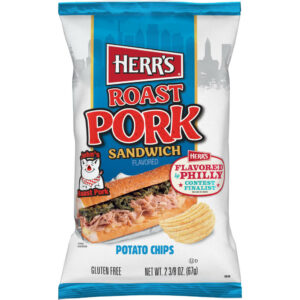
On June 13, Herr’s released three Philadelphia-inspired potato chips flavors as part of its Flavored by Philly: Local Eats contest commemorating local restaurants.
Alongside a Korean BBQ and tomato pie flavor was a potato chip imbued with the flavor of a John’s Roast Pork sandwich. On the potato chip bag is a photo of a hoagie roll piled high with pork and greens, held together with melted provolone cheese.
But something else on the package may catch the eye of Jewish Philadelphians less interested in the contents of an otherwise off-limits, non-kosher sandwich: At the bottom of the bag is a circled U with a D next to it, an Orthodox Union kosher certification.
A closer look at the ingredients supports the unlikely hechsher. The potato chips contain no pork — just potatoes, oil, seasoning, salt and cheese.
But even with an ingredients list that supports a kosher dairy certification, there’s uncertainty about the true status of the chip’s hechsher.
On July 12, a spokesperson from the OU told the Jewish Exponent, “Out of sensitivity to kosher consumers, we asked the company to remove the OU from this product.”
A spokesperson from Herr’s said, “All our manufactured products are either kosher pareve or dairy. It is a requirement of all new products to meet these standards” and that the feedback from the OU “has been reviewed and taken into consideration.”
So are the Herr’s John’s Roast Pork potato chips kosher or not kosher? As is typical in Jewish debates, the answer is yes, but it’s complicated.
“This is an old question in some ways going back several decades, in some ways going back hundreds of years,” said Congregation Beth Hamedrosh Rabbi Yonah Gross, kashrus administrator at Keystone K, a local hechsher.
Herr’s John’s Roast Pork flavored potato chips contain no treyf, and Herr’s facilities have been kosher-certified for the past 40 years, according to its spokesperson. Though the product may lose its hechsher, it may still be covered under the OU’s kosher certification and technically keep its kosher status. On the OU’s website, “Herr’s Roast Pork Sandwich Flavored Ripple Chip” is listed under “OU Kosher certified Herr Foods, Inc. Products.”
The potato chips in question may violate the Jewish legal concept of marit ayin, or appearance to the eye, the idea that because something appears to violate Jewish law — even if it technically does not — it should be forbidden for good measure.
The debate has recent precedent: In September 2021, OU did not certify Impossible Pork, a plant-based alternative to the meat product, as kosher.
“The Impossible Pork, we didn’t give an ‘OU’ to it, not because it wasn’t kosher per se,” said Rabbi Menachem Genack, the CEO of the Orthodox Union’s kosher division, in a Sept. 27, 2021, JTA.org article. “It may indeed be completely in terms of its ingredients: If it’s completely plant-derived, it’s kosher. Just in terms of sensitivities to the consumer … it didn’t get it.”
In the past, rabbis have been reluctant to put out non-dairy creamers at events unless explicitly marked as containing no dairy. Fake bacon products popularized 20 years ago provoked similar reactions, Gross said.
While the nervousness about mistaking these products for their non-kosher alternatives waned as they became more mainstream, pork imitation products remain controversial.
“Some Jews just have a visceral reaction to anything having to do with pigs,” Gross said. “It sounds like the OU just wanted to avoid that.”
It’s unclear if the hechsher will remain on the Herr’s product, but according to Gross, Jews keeping kosher can make their own choice whether to consume the potato chips.
Jews have no problem abiding by kosher certification status over a hechsher. Oreo cookies, for example, have a kosher dairy hechsher but contain no dairy. They are produced in a factory that also produces products with dairy. While many Jews will not consume Oreos with meat, they will also not wait the prescribed six hours between eating meat then dairy to eat the cookie after a meat meal.
Outside of the specific arguments for or against hechshering certain products, passages in the Talmud pave the way for permitting plant-based alternatives to dairy and meat products.
“For every enjoyment in this world that even if it may be prohibited, Hashem created an equivalent enjoyment that is permitted,” Gross said.
In cases such as food alternatives, which are not particularly hedonistic and are unlikely to cause great harm, Gross believes in following the spirit of this Talmudic statement when it comes to eating plant-based bacon or a vegan burger with cheese.
Gross said that if the OU hechsher disappears from the John’s Roast Pork potato chips, it will be unlikely that another hechsher will appear on the product.
Kosher organizations usually cooperate when deciding on certain standards. This was the case for Impossible Pork, as no Jewish major body decided to put a hechsher on the product.
“Once the national standard is set, it’s gonna be hard for it to change,” Gross said.






